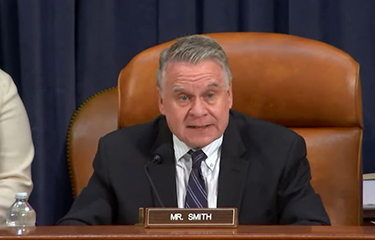U.S. lawmakers have called for the U.S. Department of Homeland Security (DHS) to investigate allegations that Chinese companies used forced labor in seafood production, as well as the complicity of the private seafood sector in those human rights violations.
“It is evident that the [People’s Republic of China] PRC is not the sole party involved in these reprehensible practices,” U.S. Rep. Chris Smith (R-New Jersey) said. “Governments – including our own – have been complicit in the procurement of tainted seafood. This is also why Senator [Jeffrey] Merkley (D-Oregon) and I have drafted a letter to the Department of Homeland Security calling for a comprehensive investigation into not only the PRC’s disturbing activities at sea and on land but also the weaknesses in our system and the complicity of the private sector in the seafood industry.”
Smith chairs the bipartisan Congressional-Executive Commission on China (CECC), a group established in 2000 to monitor human rights violations in China. The commission recently had a hearing to discuss allegations raised by the Outlaw Ocean Project that several Chinese processors were using Uyghur forced labor in seafood that was then distributed to the U.S. and other countries.
“Most of the global seafood industry is impacted,” Outlaw Ocean Project Director Ian Urbina, who authored the bombshell report, testified to the commission. “The investigation found that since 2018, more than a thousand workers from Xinjiang have been forcibly relocated to at least ten seafood processing plants in Shandong that supply dozens of major U.S. seafood brands, as well as brands in at least twenty other countries.”
Urbina also pointed out that U.S. law requires companies to prove that their supply chains are free from forced labor.
“If credible evidence is brought forward, as I think our investigation has, indicating the existence of Xinjiang labor in a particular supply chain, then this federal law, the [Uyghur Forced Labor Prevention Act], puts the onus on industry, on the companies themselves, to prove that they do not in fact have Uyghurs or other ethnic minority Xinjiang labor tied to their products and until they do, the US Customs and Border Protection, are supposed to block shipments of this import,” Urbina said.
Smith and Merkley have asked DHS to take action in investigating the allegations, including issuing withhold release orders for seafood processors in the Shandong and Liaoning provinces of China and putting companies using Uyghur labor on the “entity list” and telling importers to end business with those companies.
“Major wholesalers, restaurants, grocery chains, food service companies, and the U.S. government all import large amounts of seafood from the processing plants in Shandong and Liaoning,” the lawmakers said. “From the fish sticks served at school lunches to the fish sandwiches and calamari sold at major restaurants and grocery chains, the plates of American consumers are filled with products likely tainted with forced labor.”
The commission has also sent a letter to the head of retailer Costco, one of the companies cited in the Outlaw Ocean report, after the hearing asking for any audits or risk assessments the company conducted to justify purchasing seafood from Chinese companies.
Photo courtesy of the Congressional-Executive Commission on China







